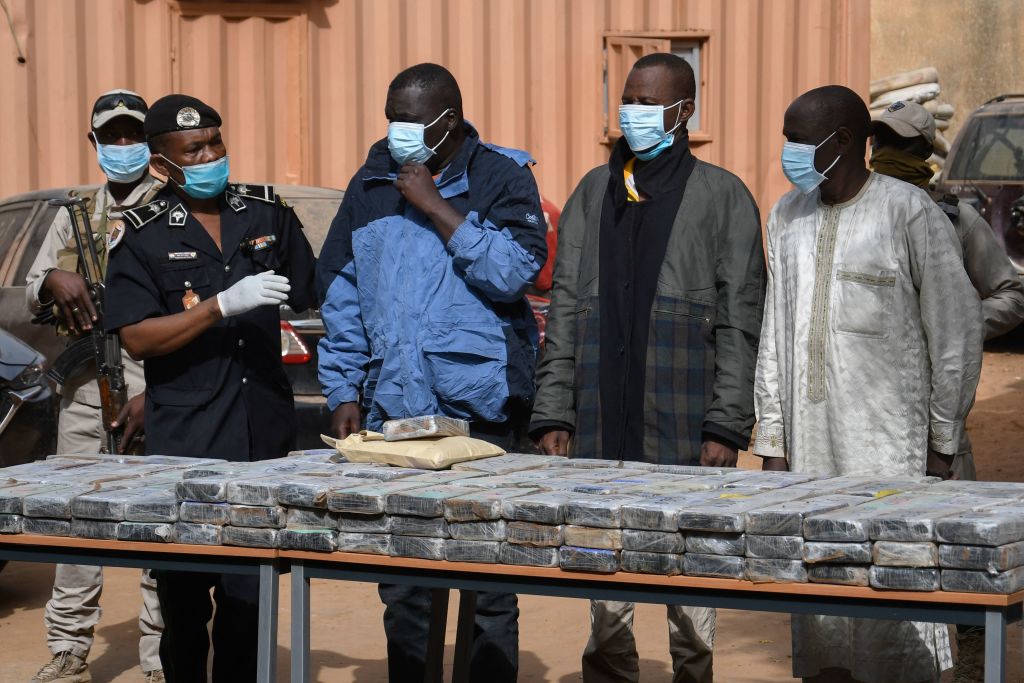The French Navy on September 22 seized nearly 10 tons of cocaine worth $610 million from an unflagged fishing vessel in the Gulf of Guinea. About three weeks earlier, the French Navy nabbed nearly six tons of cocaine worth almost $375 million in the same area.
These seizures highlight West Africa’s position as a transshipment node for cocaine shipments from Latin America. Since 2019, Western Balkan criminal groups have used West Africa as a key logistical, storage and redistribution hub for cocaine shipments bound for Europe and other areas.
According to the 2023 Global Organized Crime Index, cocaine trafficking was the fastest-growing criminal enterprise in West Africa between 2021 and 2023.
The Western Balkan cocaine syndicates operating in the region belong to Montenegrin Kavač and Škaljari clans, according to a Global Initiative Against Transnational Organized Crime (GI-TOC) report. Their presence in West Africa has deepened due to rising demand for cocaine in Europe, increasing law enforcement along more direct trafficking routes to Europe and growing partnerships with Latin American cartels.
The Western Balkan groups exploit local vulnerabilities to build relationships with corrupt workers at West African ports, law enforcement and other security services. Most of the cocaine arrives in West Africa by sea. In-region containerization — the process of using standardized containers for domestic or regional cargo transport — helps conceal the drug’s origin. These networks usually consist of flexible, tight-knit groups of 10 to 20 people who work with brokers in West African countries to organize logistics and connect with local actors.
“The use of brokers is a defining feature of these networks,” Sasa Djordevic, a senior analyst at the GI-TOC and co-author of the report, said on the organization’s website. “They provide flexibility, local access and increasingly act as points of convergence between different groups.”
The report said increasingly large volumes of cocaine were stored in West Africa between 2019 and 2024. Local drug users also reported increasing availability and that cocaine prices dropped across many urban areas in coastal countries. In Guinea-Bissau, for example, the price of 1 gram of cocaine hydrochloride dropped from $20 in 2022 to $14 in March 2024. In Ghana, prices decreased by 60% between 2019 and 2023. This deepens addiction and strains public resources, while cocaine trafficking becomes a funding source for terror groups.
“Drug trafficking has also provided terrorists with the means to operate in areas where they would not otherwise have such a strong presence,” Ana Aguilera, a researcher at the International Observatory for Terrorism Studies, wrote for the Riet Journal. “In the West African region, evidence points to the use of drug trafficking networks by terrorists to transport arms and other illicit goods, as well as to smuggle people across borders. This allows them to establish themselves in new areas and access local networks and resources.”
Members of major Western Balkan cocaine syndicates have boasted of their connections in maritime ports and airports in African countries, including Benin, South Africa and Zambia.
The Western Balkan groups generally work independently in West Africa but occasionally collaborate. They operate in two factions: those that speak Albanian and those that speak Slavic languages. Albanian-speaking groups often are built around family ties, which reinforces loyalty, while the Slavic-speaking groups are considered highly adaptable as their structures are built on personal relationships and leadership styles.
According to the GI-TOC, the growing presence of Western Balkan cocaine trafficking groups also likely will coincide with deeper corruption and higher levels of violence.
“The region may also play a growing role as a convenient hub for accommodating Western Balkan fugitives from justice and facilitating money laundering,” the GI-TOC reported.
The GI-TOC suggested several ways authorities can address the growing challenge:
1. Forge cross-continental law enforcement partnerships grounded in shared priorities.
2. Foster greater engagement with maritime shipping companies to respond to the global cocaine trafficking supply chain.
3. Gather more multisource data about West Africa’s cocaine trade to underpin profiling and risk assessments.
4. Implement “smart targeting” strategies that focus on blocking the brokers and support financial and criminal investigations.

